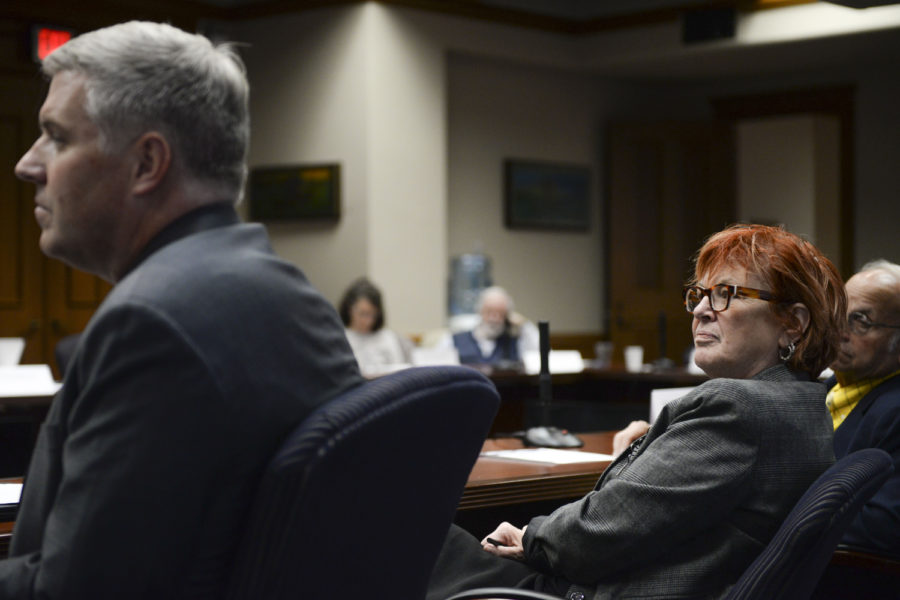The Senate Council started off with heartfelt “goodbyes” to Provost Patricia Beeson, whose hard work Chancellor Patrick Gallagher and other Senate Council members praised.
“Her role for the University and for me has been tremendous,” Chancellor Gallagher said. “This will be a year-long celebration of Patty and her achievements[…] It also will kick off a search for a worthy successor.”
But the discussion quickly shifted — the University Senate Council spent nearly half of its hour-long meeting on Wednesday discussing concerns over the possibility of a new federal tax bill and its implications.
Eight council members gave reports during the meeting and four of those reports included statements regarding the tax bill — including Gallagher, Senate Council President Frank Wilson, graduate student representative Amber Griffith and Student Government Board President Max Kneis.
The Republican house tax bill — released Nov. 2 — signals a large shift in U.S. tax policy. The bill reduces the corporate tax rate from 35 percent to 20 percent and increases the government deficit by about $1.5 trillion.
It also almost doubles the standard tax deduction — a deduction based on a person’s filing status, such as whether a person is married or single. But Gallagher said this change comes with a caveat — deductions would disappear for families with multiple children, students in college, nonprofit organizations and for companies that donate to charities and educational institutions.
“It’s hard for me to imagine a more negative bill,” Gallagher said. “It’s comprehensively bad for higher ed.”
Gallagher said the bill would also cut philanthropy nationally by 30 to 50 percent, which could adversely affect the development of the University. The changes would lead to a rise in tuition, as the University would have to offset its loss in income, he said, and this change would make it harder for individuals from lower-income families to attend Pitt.
The chancellor plans to put up a website detailing the tax bill and why it is harmful to higher education. He wants students to stay informed and understand that this tax bill affects everyone’s future.
“It’s bad for students, it’s bad for families with students, it’s bad for graduate professionals,” Gallagher said.
Wilson said the bill is a product of “dirty politics.” He said all parts of the Pitt community should begin to seriously talk about the threat the tax bill would pose and work to figure out solutions. In reference to the newly drafted Pitt principles — proposed values that are meant to guide the Pitt community in the face of controversies and challenges — Wilson said we need to take them to heart, especially in times like these.
“I never thought I’d be living in a time where education would be held in such disrepute,” Wilson said.
Griffith, a graduate student representative and a student within the department of biological sciences, said graduate students are worried about what the tax bill meant for their future. They are asking for a step-by-step plan from the University on how it plans to mitigate the impacts of the bill if it passes, Griffith said.
“They are asking, ‘do we have a what if?’” Griffith said. “What is the backup plan just in case this does go through?”
Beeson assured audience members during the meeting that the University has already started to look into the possible effects of the tax bill on the University. Graduate advisers are also making sure all relevant resources are made available to help students better understand the bill and their options, according to Griffith.
Following discussion of the tax bill, a single resolution — to apply for the Carnegie Community Engagement Classification — was passed unanimously. The classification, founded in 2008, provides a process by which the University can monitor their institutional progress and impact toward excellence in the community.
“Let’s all just raise our hands and make it unanimous,” Wilson said.
In an interview after the meeting, Wilson said he wants everyone to stay informed and speak out against the tax plan when possible. Wilson also shared his confusion as to why a mandate to repeal Obamacare was included in a tax bill, and shared his concern for the 13 million people that would lose health care.
“I wish I could wave a wand and freeze these guys until their time runs out,” Wilson said. “It’s just mean to remove something like this.”


